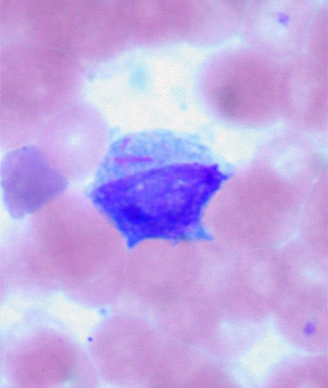Epigenetic Signature of Stem Cells Predicts Survival in AML
A score based on an epigenetic signature of hematopoietic stem cells (HSCs) is highly prognostic for patients with acute myeloid leukemia (AML), according to a new study.
Patient with apparent recurrence acute myeloid leukemia; source: Ed Uthman, Wikimedia Commons.

A score based on an epigenetic signature of hematopoietic stem cells (HSCs) is highly prognostic for patients with acute myeloid leukemia (AML), according to a new study. The score, associated with commitment of short-term HSCs to common myeloid progenitor cells, predicted survival better than more commonly used commitment-based gene expression signatures.
“In the pathogenesis of acute myeloid leukemia, genes encoding epigenetic modifiers are frequently mutated. Some of these mutations have been attributed prognostic value in AML,” wrote study authors led by Boris A. Bartholdy, PhD, of Albert Einstein College of Medicine in New York. The differentiation of HSCs to myeloid progenitor cells is accompanied by changes to DNA cytosine methylation; little is known, however, regarding those changes to DNA methylation during early human hematopoiesis.
In the new study, published February 3 in the Journal of Clinical Investigation, researchers used a PCR assay to compare cytosine methylation profiles between long-term HSCs, short-term HSCS, myeloid progenitor cells, and megakaryocyte-erythrocyte progenitors. They found that the “most striking epigenetic changes” occur with the commitment of those short-term stem cells to common myeloid progenitors, and that those changes were dominated by loss of methylation.
The researchers then developed a score based on the methylation of 561 stem cell commitment-associated loci, and analyzed it based on actual patients from several AML clinical trials. One trial involved two cohorts of patients receiving a lower and a higher dose of daunorubicin; in both cohorts, a lower epigenetic score was associated with increased overall survival. In the lower dose group, the median overall survival was 19 months for those with the lower score vs 10.8 months with a higher score (HR = 1.537; P = .0165). In the higher dose group, overall survival was 25.4 months for lower epigenetic scores and 13.2 months for higher scores (HR = 1.691; P = .0062).
That association persisted even when the two treatment arms were combined and evaluated as one. Further, a regression analysis that included both the epigenetic score and more well-established cytogenetic and molecular risk stratification, the epigenetic score was independently and significantly associated with overall survival.
“The clinical relevance of our findings will need to be confirmed in well-powered prospective randomized clinical trials,” The authors wrote. They concluded, though, that this work “reveals a stem cell commitment-associated epigenetic signature as robustly and independently prognostically significant for overall survival of AML patients.”